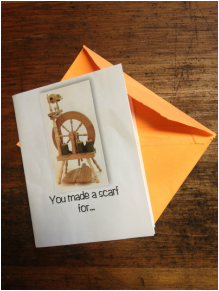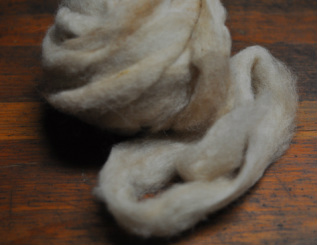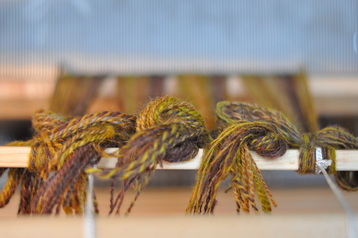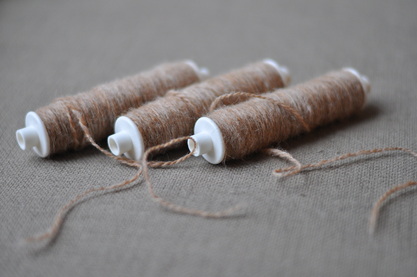 The Fiber to Scarf Exchange began a year ago at the Men's Spring Knitting Retreat. After seeing the fun reveal at last year's event, and having just purchased my first wheel, I signed up, eager to have a project to work on and a way to connect myself to the retreat during the year. The exchange works like this: Folks who are interested sign up and send fiber and a small amount of money to cover postage/etc. to the organizer. Once all the participants have submitted their fiber goodies, they're assigned a number by a person not involved in the exchange. Then, each fiber is shipped off to someone else! I signed up, mailed out fiber I purchased from Briar Rose, one of the generous retreat sponsors, and waited for my assignment.  I received a package with a large amount of 70/30 Alpaca/Corriedale blend selected by the mystery guy in early August, 2012, and it got stored away. For a long time. Part of the reason it sat was the fault of (at the time) my unorganized studio. Having recently moved I was still sorting out what I wanted the space to be and that caused me to keep the project on hold. Finally I decided to just dive in. After all, there was a lot of this fiber and certainly enough to mess up if that were to happen.... so I weighed out a bit and tried spinning it. (and it was HEAVEN!) - The fiber was lovely and apart from a bit of vegetable matter, spun right into a light dk weight 2-ply yarn quite easily. The preparation was real, true roving - light, airy strips of fiber. The spinning was the easy part. I had a little sample I was happy with and that lived on my Sidekick and as I spun (worsted short draw) I'd audit my work and check to see if it was about the same thickness. Once I was comfortable and had a bobbin of 2-ply natural yarn completed, I spun up, I realized that I didn't want to make the scarf all this color. This fiber was simply BEGGING to be dyed... so I went to my studio and found a combination of brown, grey, green and caramel that made me smile. I dyed about 4 ounces of this fiber, split into two pieces and held side by side. Those rovings were each spun as singles then plied together. Once the fiber was all spun up, I hand wound it into balls. There's just something about working with handspun that makes me want to avoid the ball winder. Hand winding it allowed me to inspect the yarn and see how even (or not!) it was through the skein. I did some math to determine how large of a scarf I wanted to make and verified that I had enough of the warp yarn. (I could always spin more weft if needed but it'd be a shame to work so hard to end up with a short scarf!)  Time to warp the loom. Early one bright morning I found myself direct warping, carefully counting off the number of warps needed for the scarf. It takes a while to warp a loom. Getting all the yarns in the right heddles, double (and triple!) checking to make sure nothing is out of place. It's the prep work that makes for a beautiful finish. Once that was done, it was time to weave!  (Almost). The next step is to wind bobbins of weft yarn in preparation for weaving. I do this using an antique bobbin winder that came with my antique sock knitting machine. I began with 3 (but I think I ended up using 5 bobbins before the scarf was complete). The 2/2 twill pattern, by the way, is from the Handweaver's Pattern Directory by Anne Dixon. My warp is 20 WPI and I used a 10 dent heddle. When it was time to weave I started by evening out the spacing on my warp using a waste yarn. Then I begin weaving my pattern, following the pedal sequence in the warping diagram: 1, 2, 3, 4, 1, 2, 3, 4, 2, 1, 4, 3, 2, 1, 4, 3... over and over. (there's lots of pedaling when ya' weave) - and just like knitting, it's VERY important to finish a row (sequence) before you stop. this was a pretty simple pattern... I imagine it takes a while to find your place in a more complex one! Once a few rows have been completed, it's time to hemstitch. This is a way to secure the fabric at the start and end of the piece and it's a simple technique once you understand the order of movements. The same thing happens at the end of the work. By the way, I LOVE my golden needle. It's one of my favorite knitting tools and anyone who is curious about a good tool for finishing, I highly recommend this type of needle! The actual weaving isn't time consuming... it takes some concentration to keep the edges straight. Since I'm somewhat new to weaving I am certainly still learning. My favorite tip so far is the use of floating selvedges. Basically, these are additional yarn warp threads that are on the ends of your fabric and are used to keep the edges straight. For this project, everything seemed to be going fine until one side started getting wavy. I wasn't sure what was wrong (at first I thought it was just tension problems) and then saw yarns hanging off the side of my weaving and realized that my some of the yarns in my warp had broken! (eeek!!!) (no photos of the bad broken warps!!) - instead, here's a closeup of the pattern. After a quick meltdown I stopped, loosened my warp a bit, and carefully tied on a new warp to the broken one and re-attached it and tightened it up nice and even. That worked great for a while and I felt a bit proud, then a different one broke. EEEEEK!. No problem. I just fixed it again. The moral to THAT story is this: (and someone correct me if I'm wrong or you have a better solution) - when working with a handspun warp or a fiber that might be a bit more fragile than ideal, the floating selvedges could be made using a stronger thread. If I was to do this over I'd use some sort of strong thread in the selvedge of the scarf. In the end, though, I think it's a respectable scarf. I cut it off my loom, used my cute little fringe twister to make fringe (which, by the way, took around 2 hours!), then I soaked the entire piece in wool wash, spun it out, and hung it up to dry. Then, it came time to attach my label, fold it up, and pack it away in my suitcase to gift it to whoever it is that I made it for. Would I do this again? In a heartbeat. During the retreat we do a show-and-tell where the exchange items are shared with everyone. I didn't take photos of that part, nor did I photograph the scarf on its new owner, but feeling this experience go full circle - starting a year ago when I watched the giving of finished handspun scarves and ending with my presenting my very own creation to another creative guy - was rewarding. It was a fun project, and I'm pretty happy with the way it turned out, especially since it's the very first time I've spun fiber into yarn for a specific project. It's frustrating to not be specific about what I'm doing from time to time, but keeping projects secret is one cure of being a designer. As you can see, I've been working (off and on!) on this for a year... and I couldn't say a thing! For those on Ravelry, the final project can be viewed (and "loved") with THIS LINK. With that in mind, I decided that I need to work on more projects than just the ones for publication. I'm hoping in the next blog post (which should be more frequent as well!) I'll talk about some of my current knitting. That post will talk more about my first ever trip to New York City and some other highlights about the Men's Spring Knitting Retreat. |
Archives
July 2023
Categories
All
|
ExploreFor Fun
|
Support |
Connect |
© 2006-2023 Kyle William. All Rights Reserved.

 RSS Feed
RSS Feed
